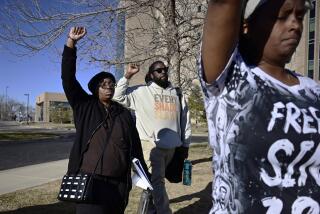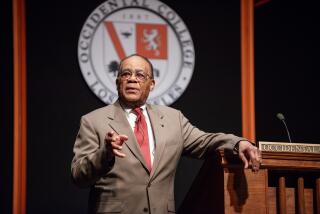Dr. Levi Watkins Jr. dies at 70; cardiac surgery innovator, activist
Dr. Levi Watkins Jr., the first surgeon to successfully implant an automatic defibrillator in a human and a civil rights activist who helped open the doors of John Hopkins University School of Medicine to minority students, has died at the age of 70.
Watkins died April 11 from a massive heart attack and stroke, his relatives said.
“Levi was a son of the South who was birthed in the middle of segregationist America and the middle of a civil rights movement and became somebody who defied the limits of the expectations of him,” said former Rep. Kweisi Mfume, who met Dr. Watkins in the 1980s on a picket line calling for better treatment of African Americans in the criminal justice system.
Watkins won acclaim in 1980, when he implanted a defibrillator in a 57-year-old female patient, a procedure that now is performed tens of thousands of times a year for patients with life-threatening episodes of ventricular fibrillation.
He became the first black chief resident of cardiac surgery at John Hopkins.
“His contributions to cardiac surgery will be legendary,” said Dr. Ben Carson, a retired John Hopkins neurosurgeon.
Watkins was born in Kansas, the third of six children, but grew up in Alabama, where he got a firsthand look at the civil rights movement.
There, at Dexter Avenue Baptist Church in Montgomery, he met the church’s pastor — the Rev. Martin Luther King Jr. When he grew older, Watkins became King’s driver, shuttling the pastor around town.
Disheartened by the injustices he saw, Watkins threw himself into the civil rights movement,
Watkins became the first African American to graduate from Vanderbilt University in Nashville with a medical degree. It was an experience he described over the years as isolating and lonely.
After graduating from Vanderbilt, Watkins started a general surgery residency at Johns Hopkins Hospital in 1971, where he became the first black chief resident of cardiac surgery. He left Baltimore for two years to conduct cardiac research at Harvard Medical School before returning to Johns Hopkins.
Watkins was considered a pioneer in open-heart surgical techniques and made many improvements in the defibrillator over the years, according to the university. In 1991, he became a professor of cardiac surgery and associate dean of Hopkins’ medical school. He retired in 2013.
“Levi was known far and wide for his pioneering surgical work, his mentorship to so many young people, his advocacy for minorities and his service as a role model,” Dr. Duke Cameron, cardiac surgeon-in-charge at Johns Hopkins hospital and professor of surgery at the school of medicine, said in a statement.
“He probably spoke at as many churches as he did at medical meetings,” Cameron said.
His contributions to the medical school reached far beyond his medical work. He was a member of the admissions committee and his recruiting efforts significantly increased minority enrollment — a 400% upswing in one four-year period. He also served as a mentor and advocate once the students arrived on campus.
At Johns Hopkins, Watkins quickly noticed that there were not a lot of other African Americans on campus, aside those who worked in the cafeteria or other service jobs, his oldest sister Annie Marie Garraway said.
“He said from Day One he would do what he could to change that. Especially because so many of their patients were from the African American community,” she said.
“He never forgot the humble roots where our grandparents started and was very aware of the sacrifices to get where he was,” Garraway said. “He never felt he was above speaking to the person who might have been thought to have the lowest-level job.”
Watkins became a personal cardiac specialist to poet Maya Angelou, whom he hosted when she came to town for checkups or speaking engagements. They had met in the mid-1970s in Alabama when both were visiting Coretta Scott King.
Mfume said Watkins was a quiet political figure who would support those officials who were committed to the idea of justice.
“He stood up, and no one could sit him down,” Mfume said.
The Rev. A.C.D. Vaughn, senior pastor at Sharon Baptist Church in Baltimore, said Watkins was “symbolic of real hope” for African Americans.
“His life shows if you are willing to do the work, you could achieve what you wanted.”
In addition to his sister, he is survived by brothers Donald V. Watkins Sr. and James Watkins, sister Doristine L. Minott, and several nieces and nephews.
Andrea K. McDaniels writes for the Baltimore Sun.
Times staff writers Joe Burris, Erin Cox and Pamela Wood contributed to this report.
More to Read
Start your day right
Sign up for Essential California for the L.A. Times biggest news, features and recommendations in your inbox six days a week.
You may occasionally receive promotional content from the Los Angeles Times.






